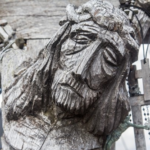We run our website the way we wished the whole internet worked: we provide high quality original content with no ads. We are funded solely by your direct support. Please consider supporting this project.

Religion that Blinds Us to God
For a variety of reasons, many Jews at the time of Jesus had come to believe that heaven had been closed since the writing of the last book of the Old Testament. God was distant and no longer active among his people. Their religion focused on holding fast to the law God had given in the past and various religious interpretations and traditions that had been developed from that law. While God had originally given the law as a means of fostering a living relationship with him, these people had made the law an end in and of itself. Rather than getting their life and worth from the God who gave the law, they were attempting to get life from the law itself.
In other words, religion had become a substitute for the living God.
This is one of the reasons these Jews couldn’t see that God was present in Jesus Christ. All they could see was a man who didn’t follow the religious rules. For example, Jesus offended them by healing and feeding people on the Sabbath and by hanging out with people with scandalously sinful lifestyles. They couldn’t see the beautiful way this revealed a God who cares more about people than rules. Because they were trying to get life from their religious tradition, they missed the beauty of what God was doing right in front of them.
In an attempt to help these misguided people get freed from their religious blindness, Jesus once responded to their criticism of his healing a man on the Sabbath by saying, “My Father is always at his work to this very day, and I, too, am working” (Jn 5:17). God hadn’t stopped being active, Jesus was saying. He’s always been about his work, and never more so than in the miracle Jesus had just performed.
It wasn’t that God had stopped talking and working. These people had simply stopped listening and looking.
If we are not careful, our own religion can blind us to the ever-present God. Instead of relying on the living God to give us the worth and significance we crave, we can easily start relying on religious traditions, doctrines, and ethical rules in order to get life. We feel like our life is worthwhile and significant because we are right—as opposed to all those who are wrong. The more tightly we cling to our religion, the more our judgments will blind us to the living God who is always active right under our noses.
Instead of rejoicing that God has just healed a man, we might find ourselves offended that one of our religious rules was broken.
Traditions, doctrines, and ethics are important. But they help us participate in the life God has for us only to the extent that they facilitate a loving relationship with God, ourselves, and others.
The Father is always doing his work, which means the time to look for the Father working is now. The place to look for the Father working is here. And the people in whom we must look for the Father to be working are ourselves and whoever we happen to encounter.
—Adapted from Present Perfect, 132-134
Photo credit: Oscar Keys via Unsplash
Category: General
Tags: Jesus, Relationships, Religion, Religious Idolatry
Related Reading

Podcast: Can We Really Have a Personal Relationship with Jesus?
It’s all about parts and wholes in this rip-roaring journey through the historical development of certain pietistic trends as Greg introduces his listeners to Depeche Mode Theology. http://traffic.libsyn.com/askgregboyd/Episode_0228.mp3

What Makes the Good News So Good
While God was revealed in various ways and to various degrees through the law and the prophets of the Old Testament, in Jesus we finally have the one who is “the exact representation of God’s being” or essence (hypostasis, Heb. 1:1-13). This is the heart of the Good News that reverberates throughout the New Testament.…

The Perfect Love of God
The Father, Son and Spirit exist as the infinite intensity and unsurpassable perfection of eternal love. We know this about the triune God not by speculation but because Jesus demonstrated that love (Rom 5:8) in his willingness to go to the furthest extreme possible to save us. When the all-holy God stooped to become our…

Do the Gospels Fabricate Prophetic Fulfillment?
Skeptically-inclined scholars, and especially critics of Christianity, frequently argue that the Gospel authors created mythological portraits of Jesus largely on the basis of OT material they claim Jesus “fulfilled.” In other words, they surveyed the OT and fabricated stories about how Jesus fulfilled those prophecies. In response, it’s hard to deny that there are certain…

The Cross in the Manger, Part 2
While some shepherds were tending their flock, an angel appeared to them announcing “good news that will cause great joy for all the people,” for it news about “a Savior…the Messiah, the Lord” (Lk 2:10-11). Most Jews of this time expected a Messiah who would save them by vanquishing their Roman oppressors and liberating Israel…

The Deadly Nature of Religious Idolatry
I’m in the process of fleshing out the core convictions of ReKnew as I laid them out in the “ReKnew Manifesto.” Our first core conviction concerns where we are to get our LIFE from, so in my previous post on this topic I addressed “The One True Source.” Before moving on to the second core conviction…
